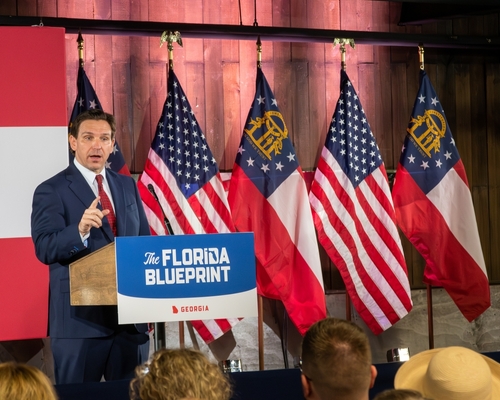Florida Governor Ron DeSantis is taking a hard stance on immigration enforcement, warning local officials who refuse to cooperate with federal authorities that they could face suspension from office. This escalation follows the Fort Myers City Council’s recent decision not to approve an agreement allowing Immigration and Customs Enforcement (ICE) to train local officers in immigration enforcement. As tensions rise between state and local governments over immigration policies, DeSantis is leveraging his gubernatorial powers to ensure that Florida maintains a unified approach to addressing illegal immigration.
DeSantis Threatens Suspension for Non-Compliant Officials
Governor DeSantis made his position clear during a recent forum on immigration, stating that local governments must be “part of the solution” or face consequences. “If these local governments are not being part of the solution, we’ve got a lot of tools, including suspension from office, that we can do now,” DeSantis declared. This strong stance follows a warning letter from Florida Attorney General James Uthmeier to Fort Myers city officials after they declined to approve an agreement that would authorize ICE to train local officers to interrogate and detain immigrants suspected of being in the country illegally.
The legislature's bill will stop FHP and FDLE's efforts to collaborate with local and federal agencies by frustrating communication and requests for assistance and instead put roadblocks up that prevent the execution and enforcement of Florida immigration law. @GovRonDeSantis… https://t.co/nh2hn9YOkb
— FLHSMV (@FLHSMV) January 29, 2025
Uthmeier’s letter emphasized that “sanctuary policies are not tolerated or lawful in Florida” and demanded “immediate corrective action.” The Attorney General indicated that Fort Myers’ refusal to participate in immigration enforcement could violate state law prohibiting “sanctuary cities” – municipalities that limit cooperation with federal immigration authorities. The city council had rejected the agreement due to concerns about potential racial profiling and negative impacts on community relations.
Expanding Federal-State Immigration Enforcement Partnerships
The confrontation with Fort Myers comes as part of a broader initiative by the DeSantis administration to strengthen cooperation between state law enforcement agencies and federal immigration authorities. Last month, DeSantis announced agreements between several Florida law enforcement agencies and ICE to handle immigrants suspected of being in the country illegally. These agreements, established under the federal 287(g) program, authorize local officers to perform certain immigration enforcement functions typically reserved for federal agents.
We must have the strongest law in the nation on immigration enforcement. We cannot be weak.
That's what the people expect and what the people have voted for in recent elections, culminating in the mandate earned by President Trump to enact the largest deportation program in… pic.twitter.com/1SNgwQ5iZH
— Ron DeSantis (@GovRonDeSantis) January 29, 2025
“Sanctuary policies are not tolerated or lawful in Florida.”
Critics argue that these agreements inappropriately place local law enforcement in the role of immigration officers, potentially damaging trust between police and immigrant communities. Immigrant advocates warn that such policies could lead to increased racial profiling and discourage immigrants from reporting crimes or cooperating with local police. Despite these concerns, DeSantis has indicated that more actions to enhance immigration enforcement will be rolled out in the coming weeks and months.
History of Removing Non-Compliant Officials
DeSantis has established a precedent for removing local officials whose policies he disagrees with, suggesting his threat of suspension carries weight. Notable examples include the removal of Democratic state prosecutors Monique Worrell and Andrew Warren for policies DeSantis opposed. Critics have characterized these removals as politically motivated, while supporters view them as necessary actions to enforce state law and maintain public safety. This history indicates DeSantis may follow through on his warnings to Fort Myers officials.
The governor’s aggressive approach to immigration enforcement aligns with Florida’s comprehensive immigration law passed last year, which imposes various restrictions on undocumented immigrants and requires employers to use the E-Verify system to check workers’ immigration status. By threatening to suspend local officials who don’t cooperate with federal immigration authorities, DeSantis reinforces his commitment to a coordinated statewide approach to immigration enforcement that leaves no room for local governments to pursue alternative policies.

